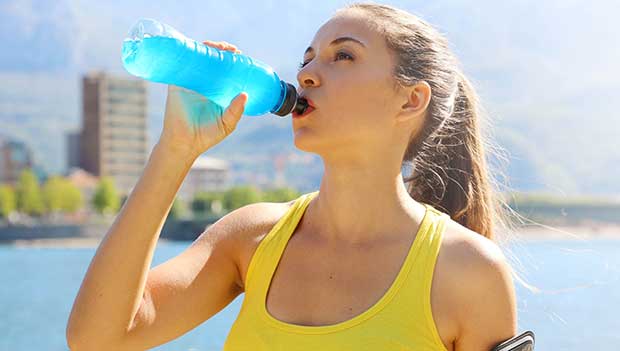
By clicking on the product links in this article, we may receive a commission fee at no cost to you, the reader. Sponsorships and affiliate commissions help support our research so we can help you find the best products. Read our full affiliate disclosure here.
Regardless of skill level, agility, or power, hydration is critical to the performance output of all athletes. Water is abundant in the human body, making up 50 to 70% of your body mass (or weight).(1) Our bodies require sufficient water for hydration and performance. Water losses of 3 to 5% of body weight are associated with lower performance in high-intensity activities, sports, and aerobic exercise.(2)
Similarly, the loss of essential electrolytes—like sodium and potassium via sweat—may put athletes at risk for dehydration. So, electrolyte drinks readily available in tablet, powder, or gel form can help offer fluids, minerals, and carbohydrates to replace those electrolyte losses.
For this article, we'll review the benefits of electrolytes and why getting electrolytes after your workout is a vital way to help quench your thirst and replenish your hydration levels.
What Are Electrolytes?
Electrolytes, including sodium, potassium, and chloride, are minerals that carry an electric charge when they dissolve in liquid like water. Here’s a little chemistry lesson. Sodium is a common cation with a positive charge (Na2+), while chloride is an anion with a negative charge (Cl2-). Other common electrolytes include phosphorus, calcium, and magnesium.
Your body’s tissues, urine, blood, and additional fluids contain electrolytes, which must stay in a healthy balance to keep all your systems functioning at their best.(3) Certain foods and beverages can help supply your body with the electrolytes needed for optimal health.
Your body depends on electrolytes to help with the following:(3)
- Transporting nutrients to cells
- Transporting waste out of cells
- Proper function of nerves, heart, brain, and muscles
- pH balance
- Fluid balance
Do Electrolytes Hydrate You?
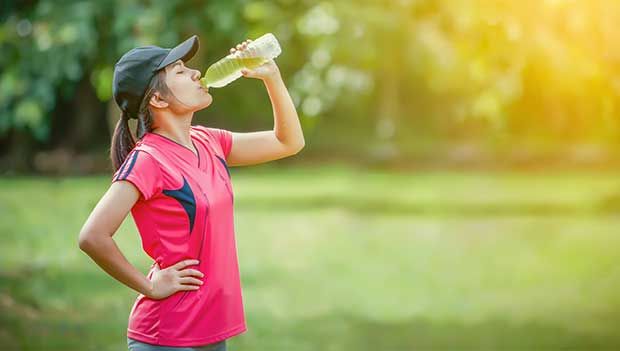
Electrolyte levels can fluctuate from low to high, depending on how much water your body can access. Dehydration happens when your body can’t get enough water, while overhydration is when it has too much water. Both conditions can influence your body’s electrolyte levels, creating an imbalance. Your body loses water through urination, defecation, respiration, and sweating.(4) Sweating is your body’s way of maintaining its internal temperature when exerting energy or spending time in a hot environment.(5) It’s not uncommon for athletes to sweat profusely and lose varying sodium levels, hence the salty skin.
Athletes, fitness enthusiasts, and the like often turn to electrolyte drinks before, during, or after sports events or workout sessions because they can help promote fluid balance. After all, beverages account for 80% of your water intake, according to a 2021 study in Nutrients, so they tend to be a quick, sure-fire way to hydrate.(6)
Want an electrolyte drink to help elevate your hydration while active? We recommend Force Factor Liquid Labs. These easy-to-transport packets mix well with water and contain 3x the electrolytes and less sugar than similar options. They are also budget-friendly and available in flavors like Mango Margarita and Fruit Punch.
Electrolytes vs. Water
While water has trace amounts of electrolytes, it may not be enough to compensate for electrolyte losses during high-intensity exercises. It’s well-known that adding salt to fluids improves fluid retention after losing electrolytes through sweat.(6)
One small 2022 study in BMC Sports Science Medicine and Rehabilitation studied 31 male college athletes given water, sports drinks, and an oral rehydration solution (ORS) to observe their hydration effects.(7) Beverage hydration index scores were higher in sports drinks and ORS, compared to water, within one to four hours of drinking. Further, there was less urine output for sports drinks and ORS versus water, showing better fluid retention with these electrolyte-rich beverages.
After a long sweat session, drinking electrolytes for dehydration can effectively replace them and restore a healthy hydration status. A 2017 study in the International Sports Nutrition and Exercise Metabolism also found a sodium beverage to be more effective than water when added to a meal, helping 80 participants retain fluid post-exercise.(8)
When dehydration isn’t prevented or treated, electrolyte levels can drop, which poses potential health risks and harm.
Symptoms of Low Electrolytes
While overhydration is possible, you’re more likely to become dehydrated from not getting the fluids your body needs to perform at best. Low levels of specific electrolytes have differing medical names and specific symptoms. For example, low sodium is hyponatremia, a common electrolyte condition that causes nausea, vomiting, and muscle cramps.
Common symptoms of low electrolytes in general include: (9,10,11,12,13,14)
- Nausea
- Vomiting
- Muscle cramps
- Weakness
- Appetite Loss
- Seizures
- Spasms
- Nerve sensations
- Congestive heart failure
- Altered Mental Status
Benefits of Electrolytes
We've already established that electrolytes are hydrating, but in what other ways are they beneficial? Electrolytes:
May Support Exercise Performance
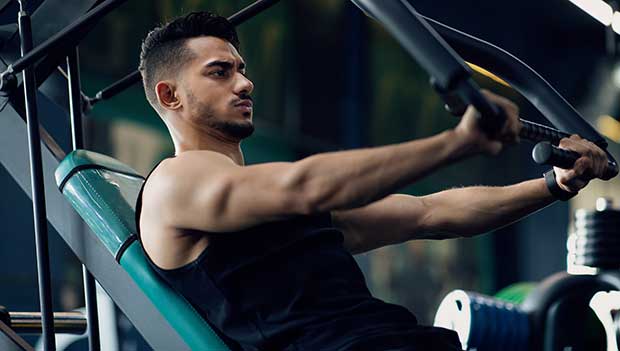
Sports experts agree that dehydration impacts physical performance, whether you’re running track, road cycling, or training for the next Ironman. Dehydration in physical activity, especially in hot temperatures, can result in greater blood flow, higher skin temperature, lower plasma volume, and reduced cardiac output.(15) These conditions can curb an athlete's performance by causing early exhaustion and less workout intensity. The Academy of Nutrition and Dietetics encourages athletes to undertake a plan to manage proper hydration, which may include electrolytes.(2)
Might Prevent Heat Stroke
Many athletes compete in hot weather conditions, which may increase the chances of heat stroke. According to the Centers for Disease Control and Prevention (CDC), heat stroke happens when the body can’t control its internal temperature, causing severe overheating. Sweating fails, and the body can't keep itself cool, wreaking havoc on health with a variety of symptoms ranging from rapid pulse to unconsciousness. Electrolytes may play a critical role in preventing heat stroke by helping you support hydration.
May Help Replenish Glycogen Stores
Your body stores carbohydrates as glycogen or readily available energy during exercise. Glycogen is metabolized or broken down as exercise intensity increases. In sports like ice hockey, glycogen can drop by more than 50%, which may cause fatigue.(16) The body needs carbohydrates to replete these glycogen stores, and many electrolyte drinks are a good source of carbohydrates in the form of dextrose, sucrose, or cane sugar.
Could Help Brain Function
Your brain is 75% water, so it makes sense that dehydration may put a damper on your thinking power. Concentration is critical during sports training and competitions, so ensuring you’re hydrated should be your top priority. Further, heat stress could impair brain function.
According to a small Chinese study in the International Journal of Environmental Research and Public Health, 12 men endured water deprivation for 36 hours, negatively affecting short-term memory and attention.(18) The participants were rehydrated with water, which improved their attention, reaction, short-term memory, and mood. Studies show electrolytes are more effective at hydration than water, and electrolytes may have a more favorable effect on brain function.(6)
An older study of athletes with mild dehydration after 12 hours without water found an impaired ability to judge the distance to a target.(19) That said, more studies of hydration and brain function are needed to understand dehydration better.
Final Takeaway
Electrolytes are essential nutrients with critical job functions to keep your body healthy. But, when electrolyte imbalances happen through sweat loss and dehydration, it can compromise your athletic performance and throw you off your game. You can utilize electrolyte drinks to help replenish losses of common electrolytes, such as calcium, sodium, and potassium. That way, your body can keep up with the many roles these minerals play in the body, from maintaining fluid balance to preserving nerve function.
Drinking electrolyte drinks or supplements may be important for athletes who engage in high-intensity sports with long durations and major sweat losses. The benefits of electrolytes could help you meet your training goals and win competitions by improving performance, preventing heat stroke, replenishing energy stores, and helping brain function.
Why Trust Us?
The health and safety of ACTIVE’s readers is of the utmost importance to us. To ensure your well-being when consuming dietary supplements, the ACTIVE.com editorial team prioritizes products that are independently tested by a third party. We’ve consulted with a team of nutritionists and dietitians to ensure the products we feature are of the highest standard. This helps us create the most accurate, authentic review content for our readers.
FAQs
Is it good to drink electrolytes everyday?
The short answer is; it depends on your lifestyle. Replenishing your electrolytes may benefit your health and performance if you engage in vigorous activity with significant sweat losses daily. If you do lower-impact, short-duration exercise, you may fare better staying hydrated with food and plain water, that’s it. Drinking daily electrolytes can be unnecessary and costly and could be a source of added sugars in your diet, depending on the type.
Are electrolytes good for you?
Normal electrolyte levels are crucial to the health of your body and its daily functions. Dehydration, medicines, or gastrointestinal stress like diarrhea can interfere with your body’s water content and trigger imbalances in your electrolyte levels, causing possible health problems. Electrolytes can be used to harmonize your electrolyte levels for good health, so yes, electrolytes are not only good for you when your electrolytes are low.
Remember that some electrolyte supplements can contain high amounts of added sugars and sodium, which could negatively impact your health over time. The 2020-2025 Dietary Guidelines for Americans recommends watching for excess added sugars and sodium levels in foods and drinks.
When should you drink electrolytes?
According to the Academy of Nutrition and Dietetics, you should manage your fluid intake before, during, and after exercise events. They also state that consuming sodium in foods and beverages could help you retain fluids. If you’re a heavy-sweating athlete, you may consider drinking electrolytes before or during exercise to lower the risk of muscle cramping. Hydration can depend on your exercise, duration, and heat conditions.
How quickly do electrolytes work?
The American College of Sports Medicine recommends hydrating with a sodium-rich drink about 45 to 90 minutes before your endurance events. Therefore, depending on the person, you could expect electrolyte drinks to work within 45 to 90 minutes.
How can I check my electrolyte levels?
Routine blood work through your medical provider can let you know your electrolyte levels. A comprehensive metabolic panel test includes testing your calcium, sodium, potassium, carbon dioxide, and chloride levels.(19) At-home electrolyte test kits are also available; however, it can be beneficial to test with your doctor for a thorough and personalized plan of action in case your levels are abnormal.
These statements have not been evaluated by the Food and Drug Administration. This product is not intended to diagnose, treat, cure, or prevent any disease.
Our Experts
- Alexandra Ginos, MBA, RD, CSP, nutritionist and fitness expert
- Roger Lockridge, 20 year fitness industry expert
- Ali Nolan, marathon runner
- David J. Sautter, NASM CPT, FNS, PES; ACE SES, personal trainer and fitness expert
- Cory Kessler, CPT, FNC, health and wellness writer
- Daniel Preiato, RD, CSCS, sports nutrition expert
- Erin Chancer, CNC, expert health and wellness writer
- Katie Simpson, CPT, health and wellness writer
- Dr. Jacob Wilson, PhD, CSCS*D, training expert
- Lindsay Boyers, functional nutritionist
- Elspeth Huyett, cycling expert
- Gaby McPherson, nutrition expert
- Krisitne Golden, triathlete
- Lindsey Cooke, CNT, nutrition therapist
- Karla Tafra, nutritionist and yoga instructor
- Rachael Gonzalez, health and wellness writer
- Sosha Lewis, certified sleep coach, health and wellness writer, CrossFit veteran
- Frieda Johnson, expert health and wellness editor
References
- Evans, G.H., James, L.J., Shirreffs, S.M., and Maughan, R.J. Optimizing the restoration and maintenance of fluid balance after exercise-induced dehydration. Journal of Applied Physiology, 2017, 122:4, 945-951. https://journals.physiology.org/doi/abs/10.1152/japplphysiol.00745.2016
- Thomas, D.T., Erdman, K.A., Burke, L.M. Position of the Academy of Nutrition and Dietetics, Dietitians of Canada, and the American College of Sports Medicine: Nutrition and Athletic Performance. Journal of the Academy of Nutrition and Dietetics. Volume 116, Issue 3, P501-528, March 2016. https://doi.org/10.1016/j.jand.2015.12.006
- National Library of Medicine (2016). Fluid and Electrolyte Balance. Retrieved June, 2023, from https://medlineplus.gov/fluidandelectrolytebalance.html
- Orrù S, Imperlini E, Nigro E, Alfieri A, Cevenini A, Polito R, Daniele A, Buono P, Mancini A. Role of Functional Beverages on Sport Performance and Recovery. Nutrients. 2018 Oct 10;10(10):1470. doi: 10.3390/nu10101470. PMID: 30308976; PMCID: PMC6213308.
- Nutrition and Athletic Performance. Medicine & Science in Sports & Exercise 48(3):p 543-568, March 2016. | DOI: 10.1249/MSS.0000000000000852
- Millard-Stafford M, Snow TK, Jones ML, Suh H. The Beverage Hydration Index: Influence of Electrolytes, Carbohydrate and Protein. Nutrients. 2021 Aug 25;13(9):2933. doi: 10.3390/nu13092933. PMID: 34578811; PMCID: PMC8465972.
- Yun HJ, Lee JY, Jeon M, Oh SE, Park JH, Yoon J. The effects of fluid absorption and plasma volume changes in athletes following consumption of various beverages. BMC Sports Sci Med Rehabil. 2022 Dec 8;14(1):207. doi: 10.1186/s13102-022-00583-2. PMID: 36476514; PMCID: PMC9730682.
- Evans, G. H., Miller, J., Whiteley, S., & James, L. J. (2017). A Sodium Drink Enhances Fluid Retention During 3 Hours of Post-Exercise Recovery When Ingested With a Standard Meal, International Journal of Sport Nutrition and Exercise Metabolism, 27(4), 344-350. Retrieved Jun 1, 2023, from https://doi.org/10.1123/ijsnem.2016-0196
- Rondon H, Badireddy M. Hyponatremia. [Updated 2023 Jan 23]. In: StatPearls [Internet]. Treasure Island (FL): StatPearls Publishing; 2023 Jan-. Available from: https://www.ncbi.nlm.nih.gov/books/NBK470386/
- Castro D, Sharma S. Hypokalemia. [Updated 2023 Mar 18]. In: StatPearls [Internet]. Treasure Island (FL): StatPearls Publishing; 2023 Jan-. Available from: https://www.ncbi.nlm.nih.gov/books/NBK482465/
- Sharma S, Hashmi MF, Castro D. Hypophosphatemia. [Updated 2022 Dec 26]. In: StatPearls [Internet]. Treasure Island (FL): StatPearls Publishing; 2023 Jan-. Available from: https://www.ncbi.nlm.nih.gov/books/NBK493172/
- Gragossian A, Bashir K, Bhutta BS, et al. Hypomagnesemia. [Updated 2022 Nov 4]. In: StatPearls [Internet]. Treasure Island (FL): StatPearls Publishing; 2023 Jan-. Available from: https://www.ncbi.nlm.nih.gov/books/NBK500003/
- Goyal A, Anastasopoulou C, Ngu M, et al. Hypocalcemia. [Updated 2022 Jul 24]. In: StatPearls [Internet]. Treasure Island (FL): StatPearls Publishing; 2023 Jan-. Available from: https://www.ncbi.nlm.nih.gov/books/NBK430912/
- Shrimanker I, Bhattarai S. Electrolytes. [Updated 2022 Jul 25]. In: StatPearls [Internet]. Treasure Island (FL): StatPearls Publishing; 2023 Jan-. Available from: https://www.ncbi.nlm.nih.gov/books/NBK541123/
- Armstrong LE. Rehydration during Endurance Exercise: Challenges, Research, Options, Methods. Nutrients. 2021 Mar 9;13(3):887. doi: 10.3390/nu13030887. PMID: 33803421; PMCID: PMC8001428.
- Vigh-Larsen, J.F., Ørtenblad, N., Spriet, L.L. et al. Muscle Glycogen Metabolism and High-Intensity Exercise Performance: A Narrative Review. Sports Med 51, 1855–1874 (2021). https://doi.org/10.1007/s40279-021-01475-0
- Zhang N, Du SM, Zhang JF, Ma GS. Effects of Dehydration and Rehydration on Cognitive Performance and Mood among Male College Students in Cangzhou, China: A Self-Controlled Trial. Int J Environ Res Public Health. 2019 May 29;16(11):1891. doi: 10.3390/ijerph16111891. PMID: 31146326; PMCID: PMC6603652.
- Smith MF, Newell AJ, Baker MR. Effect of acute mild dehydration on cognitive-motor performance in golf. J Strength Cond Res. 2012 Nov;26(11):3075-80. doi: 10.1519/JSC.0b013e318245bea7. PMID: 22190159.
- National Library of Medicine (2021). Comprehensive Metabolic Panel (CMP). Retrieved June, 2023, from https://medlineplus.gov/lab-tests/comprehensive-metabolic-panel-cmp/
About the Author

Gaby is a registered dietitian and nutritionist who works as a full-time freelance writer, specializing in evidence-based health and nutrition articles. She’s written for publications like Healthline, Ovia Health, Happiest Baby, Once Upon a Farm, EatingWell, and more.

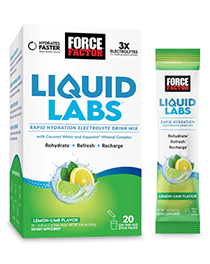
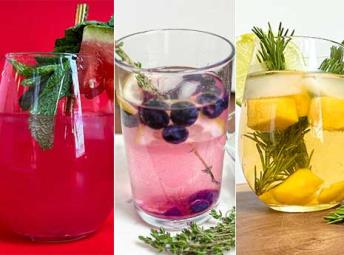

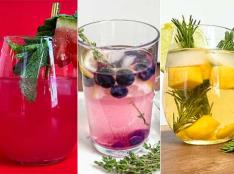
Discuss This Article